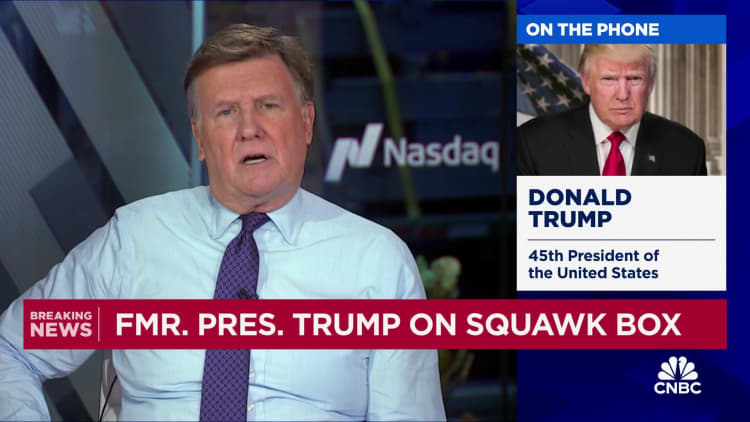[ad_1]
Republican presidential candidate former U.S. President Donald Trump and Democratic Party presidential candidate U.S. President Joe Biden speak during a presidential debate in Atlanta, Georgia, U.S., June 27, 2024 in a combination photo.
Brian Snyder | Reuters
The future of Social Security and Medicare may be greatly impacted by whoever occupies the White House following the November presidential election.
When asked during Thursday night’s presidential debate who is the biggest risk to those programs, President Joe Biden and former President Donald Trump pointed to each other.
Biden said Trump wants to “get rid of” Social Security and cut Medicare.
Trump said Biden is “destroying” those programs.
Social Security provides monthly income to more than 72 million beneficiaries, including retired and disabled workers and families. Medicare provides health coverage to more than 65 million Americans age 65 and over.
With more than 11,000 Americans now turning 65 every day, according to estimates from the Retirement Income Institute at the Alliance for Lifetime Income, more retirees are relying on support from both programs.
When voters age 50 and up were asked how important Social Security is to their vote this November, 80% said it is extremely important or very important, a recent AARP survey found.
While those voters want a candidate who will protect the program, their support is still up for grabs, according to the results.
Both Biden and Trump moved to win those voters on Thursday. Here’s what they said.
Biden: ‘Make the wealthy begin to pay their fair share’
When Biden was asked how he would keep Social Security solvent, he reiterated promises he made during the State of the Union to make the wealthy pay more toward the program.
Social Security’s trust funds face a looming depletion date. The program’s trustees project Social Security’s combined funds may run out in 2035, at which point 83% of benefits will be payable unless Congress acts sooner.
Social Security relies on payroll taxes. Currently, that includes 6.2% of a worker’s pay — which is matched by employers — on up to $168,600 in 2024 earnings.

Biden is proposing that those payroll taxes are also applied to earnings over $400,000. Similar Democratic proposals also call for additional taxes on investment income.
“I would not raise the cost of Social Security for anybody under $400,000,” Biden said on the debate stage on Thursday. “After that, I begin to make the wealthy begin to pay their fair share.”
While the taxable maximum is adjusted each year, the percentage of total earnings above that threshold has increased over time. This year, that meant a top earner with $1 million in gross annual wage income stopped paying into Social Security in March.
Unlike Biden, Trump did not suggest specific changes to Social Security during the debate.
Trump: Millions of immigrants get Social Security
Trump said Biden is “destroying” Social Security by letting millions of people into the country, who he claimed are accessing not only that program but also Medicare and Medicaid.
“Trump baselessly claimed that that undocumented workers are collecting benefits — a myth that has no basis in reality,” Max Richtman, president and CEO of the National Committee to Preserve Social Security and Medicare, said in a statement.
“Undocumented workers are not eligible for Social Security benefits, period,” Richtman said. “Either Trump doesn’t understand how America’s greatest social insurance programs work — or he is purposely lying.”
Immigration may instead help Social Security’s funding woes, experts say, by increasing the number of people who will work and pay payroll taxes into the program.
That goes for illegal immigration as well, where workers tend to adopt false Social Security numbers and therefore still contribute to the program without working toward benefit eligibility, Social Security expert Laura Haltzel said in May.
Trump: ‘I’m the one that got the insulin down’
Members of the media work during the first presidential debate with US President Joe Biden and former US President Donald Trump in Atlanta, Georgia, US, on Thursday, June 27, 2024.
Eva Marie Uzcategui | Bloomberg | Getty Images
Medicare now has a $35 cap on co-payments for insulin, and both Biden and Trump take credit for the change.
While Biden incorrectly said during the debate that the price was lowered to $15 per shot, Trump said he was the one to actually lower those prices.
“I took care of the seniors,” Trump said.
It’s not the first time that Trump has suggested he lowered insulin costs. The former president also recently made the same claims on his social media platform, Truth Social.
A recent analysis by health policy research organization KFF evaluated the efforts by both presidents to lower insulin costs.
Trump established a voluntary, limited-time model from 2021 to 2023 where participating Medicare Part D prescription drug plans covered one dosage form and type of insulin product that was capped at $35 per month.
Biden signed the Inflation Reduction Act, which starting in 2023 made it so Medicare Part D plans can only charge up to $35 per month for covered insulin treatments, while cost sharing for insulin under Medicare Part B is also limited to $35 per month. Deductibles also no longer apply to insulin under either Medicare plan.
Trump’s plan affected around 800,000 insulin users in 2022, according to KFF, while Biden’s plan may affect about 3.3 million insulin users covered by Medicare Part D, as well as Medicare Part B beneficiaries.
“The Trump Administration’s $35 insulin copay model had a more limited reach than the insulin copay cap now in place under the Inflation Reduction Act that President Biden signed into law,” wrote KFF experts Juliette Cubanski, deputy director of the program on Medicare policy, and Tricia Neuman, executive director for the program on Medicare policy.
[ad_2]
